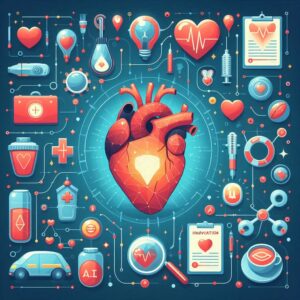Introduction
Artificial Intelligence (AI) is revolutionizing healthcare, enhancing diagnostics, treatment planning, patient management, and medical research. AI-powered tools optimize clinical workflows, assist healthcare professionals in making accurate decisions, and improve patient outcomes. This guide explores the latest AI innovations in healthcare, providing insights into their applications and how they align with SEO best practices for maximum online visibility.

Step 1: The Role of AI in Healthcare
AI tools in healthcare automate complex tasks, analyze medical data, and enhance precision medicine. Some key applications include:
- AI-Powered Diagnostics – AI detects diseases in radiology scans, pathology slides, and medical reports.
- Predictive Healthcare Analytics – AI forecasts patient health risks based on historical data.
- AI-Assisted Robotic Surgery – Enhances surgical precision and reduces recovery time.
- Virtual Health Assistants – AI chatbots provide symptom assessments and medication reminders.
- AI-Driven Drug Discovery – Accelerates pharmaceutical research and clinical trials.
AI empowers healthcare providers, researchers, and patients by improving efficiency and accuracy.
Step 2: Choosing the Best AI Tools for Healthcare Innovation
Developing AI-powered healthcare solutions requires the right technologies to ensure scalability and compliance.
Programming Languages & AI Frameworks
- Python – Ideal for medical data analysis and AI algorithms.
- R – Suitable for statistical modeling and health research.
- TensorFlow / PyTorch – Used for medical deep learning applications.
AI-Powered Medical Imaging & Diagnostics
- IBM Watson Health – AI-based radiology diagnostics and clinical decision-making.
- Google DeepMind Health – AI-assisted medical imaging and disease detection.
- – AI-powered chest X-ray and CT scan interpretation.
Predictive Analytics & Patient Monitoring Tools
- NVIDIA Clara – AI-driven real-time patient monitoring and medical imaging.
- Health Catalyst – AI-powered analytics for population health management.
- Microsoft Azure Health Bot – AI chatbot solutions for healthcare providers.
With the right AI tools, healthcare organizations enhance precision, efficiency, and automation.
Step 3: Data Collection & AI Model Training for Healthcare
AI models need high-quality, structured medical data to deliver accurate predictions.
Sources of Medical Data for AI Training
- Electronic Health Records (EHRs) – AI extracts patterns from patient histories.
- Medical Imaging Datasets – AI enhances X-ray, MRI, and CT scan interpretation.
- Genomic & Biomedical Research Data – AI aids precision medicine and genetic therapies.
- Wearable Device & Remote Monitoring Data – AI tracks real-time patient health metrics.
Preprocessing Healthcare Data for AI Models
- De-identification & Data Privacy Compliance – Ensures patient data security.
- Data Cleaning & Standardization – Enhances AI model accuracy.
- Feature Engineering for AI Training – Selects key medical indicators for predictions.
Structured, privacy-compliant data improves AI accuracy and patient safety.
Step 4: AI-Powered Healthcare Solutions in Action
Once trained, AI models optimize decision-making and streamline patient care.
AI Applications in Hospitals & Clinics
- Automated Medical Coding & Billing – AI reduces administrative workload.
- AI-Enhanced Telemedicine – AI assists virtual consultations with medical history analysis.
- Smart Wearable Health Devices – AI-powered monitoring for chronic disease management.
AI for Medical Research & Drug Discovery
- Genomic AI Research – AI identifies disease-related genetic mutations.
- AI-Driven Drug Formulation – Accelerates pharmaceutical breakthroughs.
- Predictive Clinical Trial Models – AI improves drug testing accuracy.
AI transforms healthcare delivery and accelerates medical advancements.
Step 5: SEO Optimization for AI Healthcare Solutions
To improve online visibility, AI healthcare innovations require SEO-friendly strategies.
Best SEO Practices for AI Healthcare Tools
- Keyword Optimization – Use terms like “AI healthcare innovation,” “AI-powered diagnostics,” and “medical AI solutions.”
- Mobile Optimization – Ensure AI-powered health platforms are accessible on smartphones.
- Content Marketing with Case Studies – Publish articles showcasing AI’s impact in healthcare.
- Technical SEO Enhancements – Improve site speed and structured metadata for Google ranking.
- Backlinking to Medical Research & AI Healthcare Sites – Establish credibility and authority.
SEO-driven AI healthcare solutions increase adoption and patient accessibility.
Step 6: Monitoring & Enhancing AI Healthcare Performance
AI-powered healthcare systems require continuous updates and refinements.
Key Metrics for AI Healthcare Innovations
- Diagnosis Accuracy Rates – AI predictions must meet clinical standards.
- Patient Engagement Metrics – AI chatbots and virtual assistants improve patient communication.
- Data Security & HIPAA Compliance – AI tools must maintain privacy regulations.
- Real-Time Model Updates – AI adapts to emerging medical research and evolving healthcare trends.
Regular AI improvements enhance patient outcomes and healthcare reliability.
Final Thoughts
AI-powered healthcare innovations revolutionize diagnostics, treatment, and patient management, offering faster, more accurate, and automated healthcare solutions. By combining machine learning, predictive analytics, medical imaging AI, and SEO optimization, healthcare providers and researchers can drive groundbreaking advancements.
